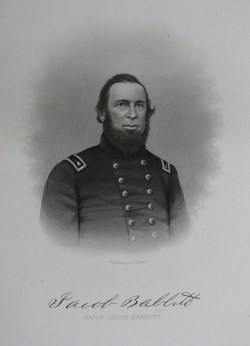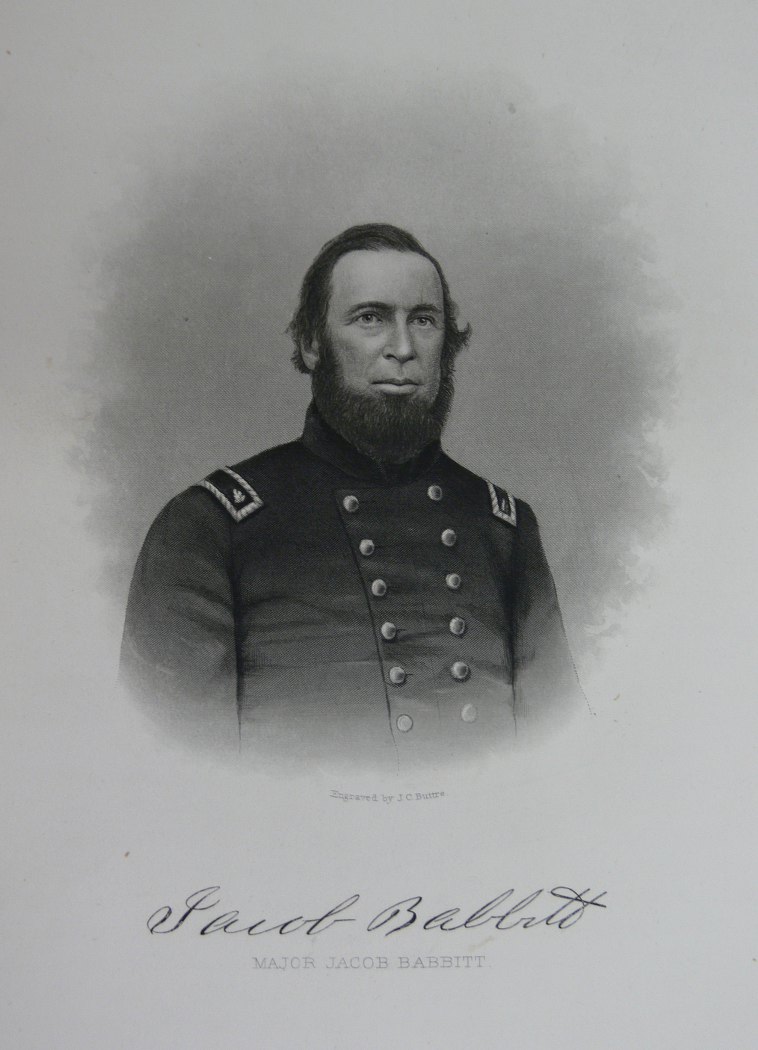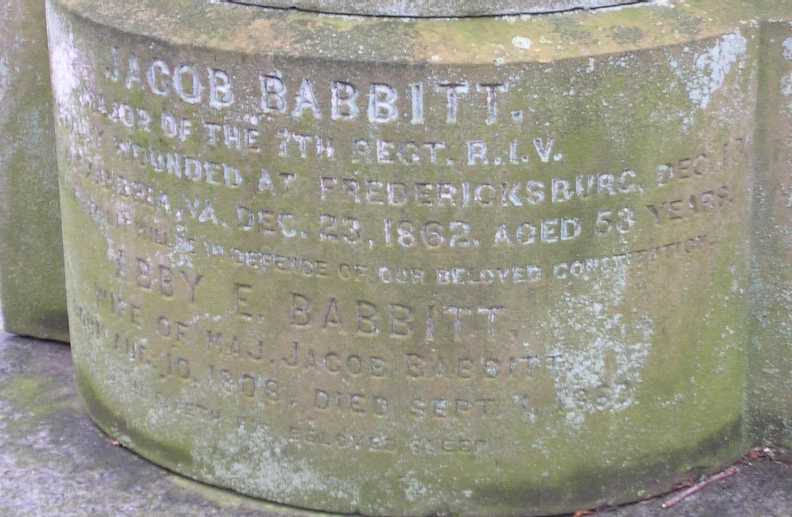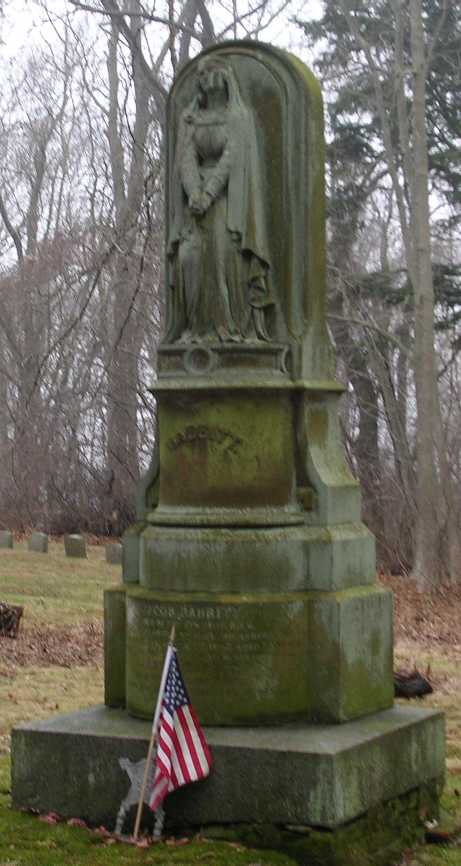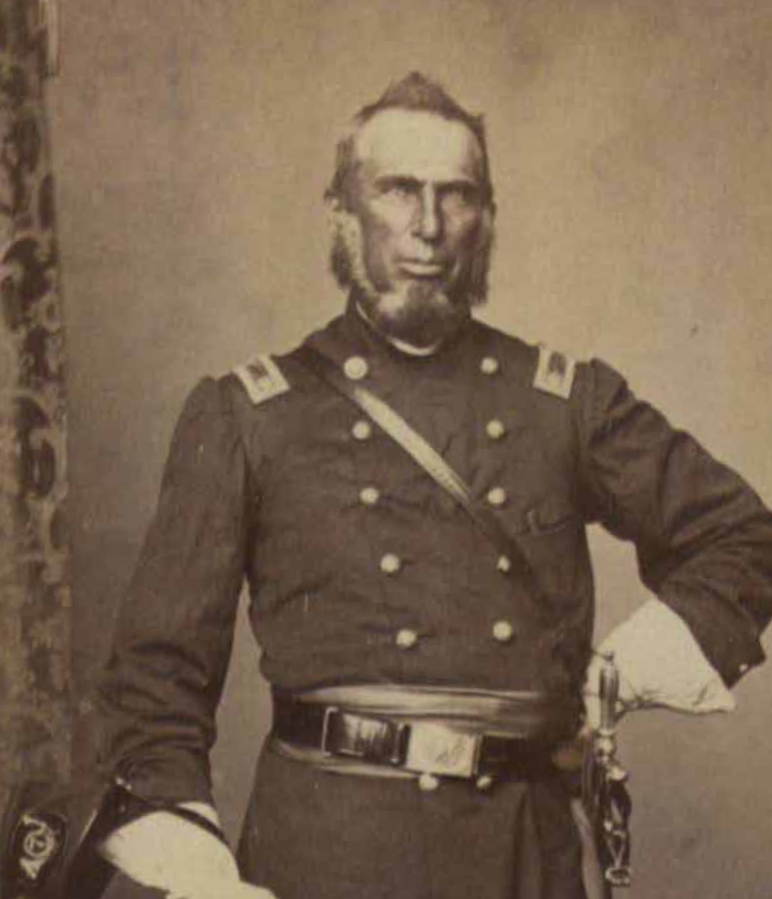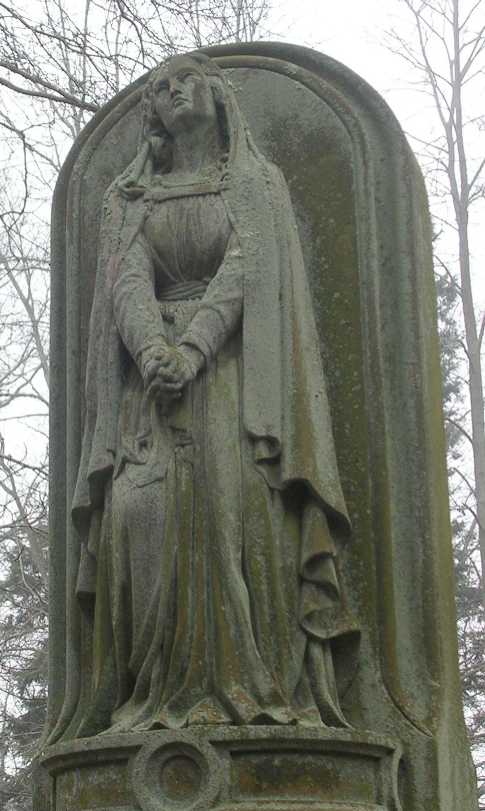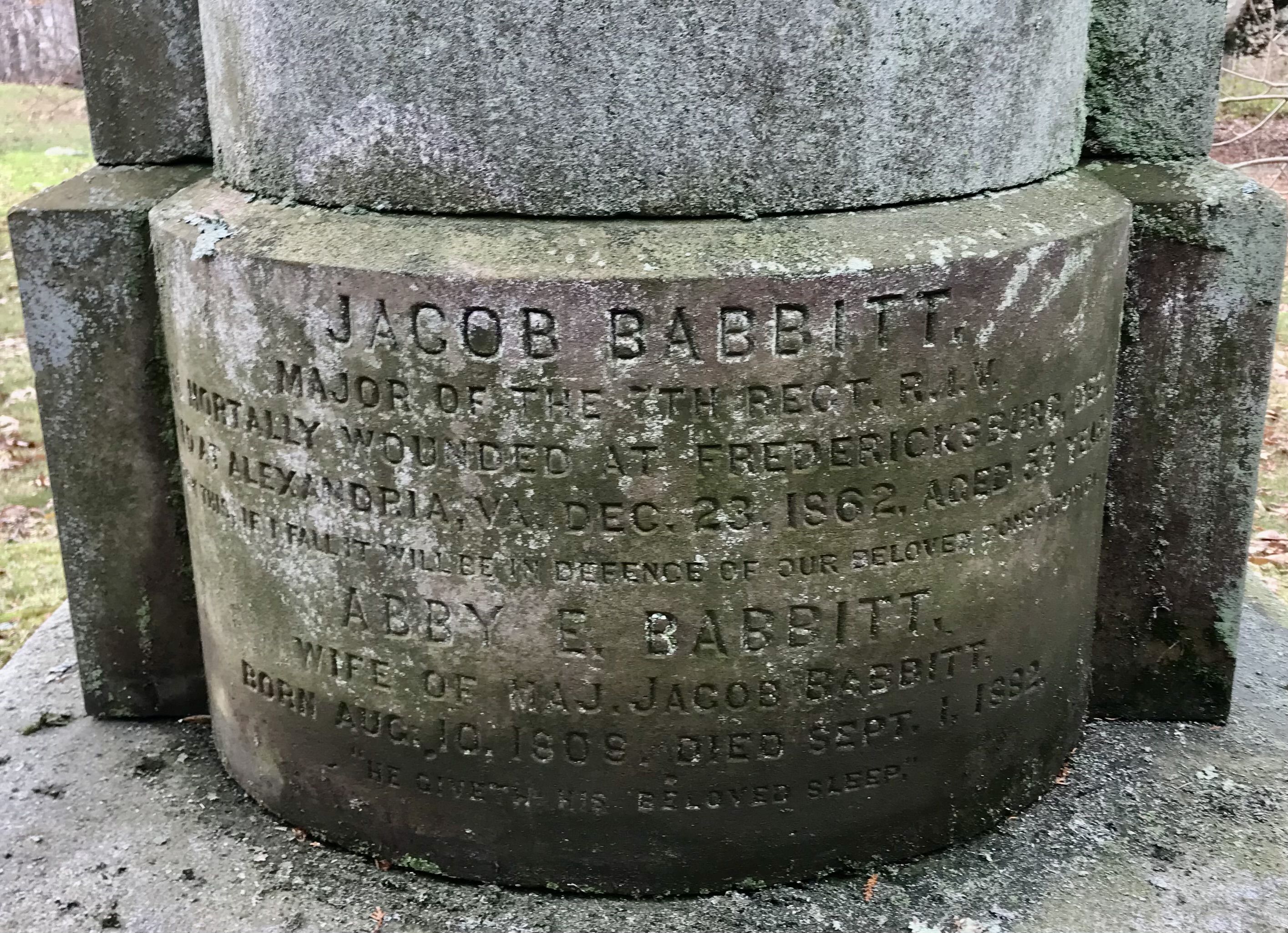We are grieved to record the death of our gallant townsman, Major Jacob Babbitt. Major Babbitt was born in Bristol in the year 1809; he was a son of the late Jacob Babbitt, who was a wealthy and prominent citizen of this place. He was educated in a Military Academy, at Middletown, Ct. At an early age he was married to Abby E.P., the only daughter of the late lamented Dr. L.W. Briggs of this town. After the death of his father in 1850 he became extensively engaged in the manufacturing business. At the breaking out of the present Rebellion, he received a commission as Major in the Tenth Regiment of R.I. Volunteers. As an officer he was brave, cool and self-possessed. At the battle of Fredericksburg he was severely wounded in the breast and arm. He died from the effects of these wounds at the Mansion House Hospital, in Alexandria, Va., December 23, 1862. At the time of his death he was President of the Commercial Bank of this town, and Chief Engineer of the Fire Department.
*******
Major Jacob Babbitt, only son of Jacob and Bathsheba B. Babbitt, was born in Bristol, R.I., May 9, 1809. His education was chiefly obtained at the then famous military academy taught by Capt. Alden Partidge at Middletown, Conn., and at Norwich, Vt. Soon after his return from the mililtary academy, he married Oct. 7, 1826, Abby Eliza, only daughter of Dr. Lemuel W. Briggs, and thereafter for several years engaged in agriculture. This he eventually abandoned in order to succeed to his father's business as a West Indian merchant, and, subsequently, became largely interested in the manufacture of cotton goods. The first mill in his native town was erected through his own and his father's enterprise. It was subsequently destroyed by fire, but rebuilt by his persistent efforts. He was also a large owner in the second of the two original mills of the town which in later days shared the fate of the first. He alone caused it to arise likewise from its ashes, and he put in full activity. The Rebellion closed its doors, and made a failure of what soon would have been a financial success.
No small portion of Mr. Babbitt's time was devoted to public affairs. He was active in the formation of the King Philip Fire Company, and for many years its foreman. He was also firewarden for a long time. The system of water supply by pipes and hydrants connected with the forcepumps of the mills was largely due to his labors. He was instrumental in the organization of the Bristol gas works. Upon the resignation of his father he became president of the Commercial Bank. Both those positions he held until death. As vestryman of St. Michael's Church, and trustee of the new Juniper Hill Cemetery, he proved himself useful. The town frequently sent him to the State legislature. His recreation was yachting. In politics he was a Jacksonian Democrat. His loyalty to constituted authority was strong and abiding, and when, in 1842, members of his own party proved recreant to their duty as law-abiding citizens, he went to the field, shoulder to shoulder with his political antagonists, with no thought but to maintain and vindicate the majesty of the government. Again, as delegate of his party at Charleston and Baltimore, in 1860, he with others used every effort to check the rebellious tendency of the Southern members, and, when this proved of no avail, and our national existence was placed in jeopardy, he counted his life not too dear a price to pay to maintain the supremacy of the constitution. In his last letter came the words: 'Should it be my lot to fall, know that it was in defense of our beloved Constitution.'
As a result of early training Mr. Babbitt's interest in military matters never flagged. In June, 1829, he was made inspector of the First Brigade of State Militia, and his thorough knowledge of tactics was often made serviceable in the drill-room of the Bristol Artillerty. As soon after the outbreak of the Rebellion as business permitted, though far beyond the age at which military duty is exacted, he entered the field as major of the Tenth Rhode Island Volunteers, a three months' regiment, with which he served from June 9, 1862, until September 1st, when he was commissioned to the same rank in the Seventh. At Fredericksburg, when the men were lying on the ground protected by a ridge less than three feet high, and a regiment less advanced was firing over their heads, Colonel Bliss received orders to make one more attempt on the entrenchments in their front. The major at one started to the rear to request that its firing be discontinued, when a ball passed in at one shoulder and out under the arm inflicting what was not deemed to be a serious wound, but age and subsequent exposure proved to much for him, and he died at Mansion House Hospital, Alexandria, Va., Dec. 23, 1862, leaving a widow and five children: Rev. Benjamin Bosworth, Edward Spalding, Sarah Scott, wife of Luther A. Martin, M.D., May Abby, afterward wife of Commander Samuel Dana Greene, United States Navy, and Julia Emily. The funeral occurred Jan. 1, 1863, at St. Michael's Church, with full military and civic honors.
(from The Seventh Regiment of RI Volunteers in the Civil War, 1862 - 1865 by William P. Hopkins, Snow & Farmham Printers, Providence, RI, 1903)
G.A.R. Post #15 in Bristol was named in his honor.
We are grieved to record the death of our gallant townsman, Major Jacob Babbitt. Major Babbitt was born in Bristol in the year 1809; he was a son of the late Jacob Babbitt, who was a wealthy and prominent citizen of this place. He was educated in a Military Academy, at Middletown, Ct. At an early age he was married to Abby E.P., the only daughter of the late lamented Dr. L.W. Briggs of this town. After the death of his father in 1850 he became extensively engaged in the manufacturing business. At the breaking out of the present Rebellion, he received a commission as Major in the Tenth Regiment of R.I. Volunteers. As an officer he was brave, cool and self-possessed. At the battle of Fredericksburg he was severely wounded in the breast and arm. He died from the effects of these wounds at the Mansion House Hospital, in Alexandria, Va., December 23, 1862. At the time of his death he was President of the Commercial Bank of this town, and Chief Engineer of the Fire Department.
*******
Major Jacob Babbitt, only son of Jacob and Bathsheba B. Babbitt, was born in Bristol, R.I., May 9, 1809. His education was chiefly obtained at the then famous military academy taught by Capt. Alden Partidge at Middletown, Conn., and at Norwich, Vt. Soon after his return from the mililtary academy, he married Oct. 7, 1826, Abby Eliza, only daughter of Dr. Lemuel W. Briggs, and thereafter for several years engaged in agriculture. This he eventually abandoned in order to succeed to his father's business as a West Indian merchant, and, subsequently, became largely interested in the manufacture of cotton goods. The first mill in his native town was erected through his own and his father's enterprise. It was subsequently destroyed by fire, but rebuilt by his persistent efforts. He was also a large owner in the second of the two original mills of the town which in later days shared the fate of the first. He alone caused it to arise likewise from its ashes, and he put in full activity. The Rebellion closed its doors, and made a failure of what soon would have been a financial success.
No small portion of Mr. Babbitt's time was devoted to public affairs. He was active in the formation of the King Philip Fire Company, and for many years its foreman. He was also firewarden for a long time. The system of water supply by pipes and hydrants connected with the forcepumps of the mills was largely due to his labors. He was instrumental in the organization of the Bristol gas works. Upon the resignation of his father he became president of the Commercial Bank. Both those positions he held until death. As vestryman of St. Michael's Church, and trustee of the new Juniper Hill Cemetery, he proved himself useful. The town frequently sent him to the State legislature. His recreation was yachting. In politics he was a Jacksonian Democrat. His loyalty to constituted authority was strong and abiding, and when, in 1842, members of his own party proved recreant to their duty as law-abiding citizens, he went to the field, shoulder to shoulder with his political antagonists, with no thought but to maintain and vindicate the majesty of the government. Again, as delegate of his party at Charleston and Baltimore, in 1860, he with others used every effort to check the rebellious tendency of the Southern members, and, when this proved of no avail, and our national existence was placed in jeopardy, he counted his life not too dear a price to pay to maintain the supremacy of the constitution. In his last letter came the words: 'Should it be my lot to fall, know that it was in defense of our beloved Constitution.'
As a result of early training Mr. Babbitt's interest in military matters never flagged. In June, 1829, he was made inspector of the First Brigade of State Militia, and his thorough knowledge of tactics was often made serviceable in the drill-room of the Bristol Artillerty. As soon after the outbreak of the Rebellion as business permitted, though far beyond the age at which military duty is exacted, he entered the field as major of the Tenth Rhode Island Volunteers, a three months' regiment, with which he served from June 9, 1862, until September 1st, when he was commissioned to the same rank in the Seventh. At Fredericksburg, when the men were lying on the ground protected by a ridge less than three feet high, and a regiment less advanced was firing over their heads, Colonel Bliss received orders to make one more attempt on the entrenchments in their front. The major at one started to the rear to request that its firing be discontinued, when a ball passed in at one shoulder and out under the arm inflicting what was not deemed to be a serious wound, but age and subsequent exposure proved to much for him, and he died at Mansion House Hospital, Alexandria, Va., Dec. 23, 1862, leaving a widow and five children: Rev. Benjamin Bosworth, Edward Spalding, Sarah Scott, wife of Luther A. Martin, M.D., May Abby, afterward wife of Commander Samuel Dana Greene, United States Navy, and Julia Emily. The funeral occurred Jan. 1, 1863, at St. Michael's Church, with full military and civic honors.
(from The Seventh Regiment of RI Volunteers in the Civil War, 1862 - 1865 by William P. Hopkins, Snow & Farmham Printers, Providence, RI, 1903)
G.A.R. Post #15 in Bristol was named in his honor.
Inscription
Major of the 7th Regt. R.I.V. Fell mortally wounded at Fredericksburg Dec. 13. Died at Alexandria, Va. Dec. 23, 1862. Know this, if I fall it will be in defense of our beloved Constitution.
Family Members
Advertisement
Advertisement
